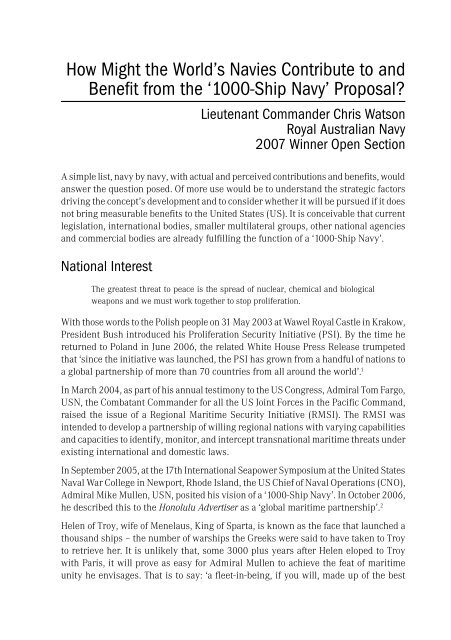Australian Maritime Issues 2007 - Royal Australian Navy
Australian Maritime Issues 2007 - Royal Australian Navy
Australian Maritime Issues 2007 - Royal Australian Navy
Create successful ePaper yourself
Turn your PDF publications into a flip-book with our unique Google optimized e-Paper software.
How Might the World’s Navies Contribute to and<br />
Benefit from the ‘1000-Ship <strong>Navy</strong>’ Proposal?<br />
Lieutenant Commander Chris Watson<br />
<strong>Royal</strong> <strong>Australian</strong> <strong>Navy</strong><br />
<strong>2007</strong> Winner Open Section<br />
A simple list, navy by navy, with actual and perceived contributions and benefits, would<br />
answer the question posed. Of more use would be to understand the strategic factors<br />
driving the concept’s development and to consider whether it will be pursued if it does<br />
not bring measurable benefits to the United States (US). It is conceivable that current<br />
legislation, international bodies, smaller multilateral groups, other national agencies<br />
and commercial bodies are already fulfilling the function of a ‘1000-Ship <strong>Navy</strong>’.<br />
National Interest<br />
The greatest threat to peace is the spread of nuclear, chemical and biological<br />
weapons and we must work together to stop proliferation.<br />
With those words to the Polish people on 31 May 2003 at Wawel <strong>Royal</strong> Castle in Krakow,<br />
President Bush introduced his Proliferation Security Initiative (PSI). By the time he<br />
returned to Poland in June 2006, the related White House Press Release trumpeted<br />
that ‘since the initiative was launched, the PSI has grown from a handful of nations to<br />
a global partnership of more than 70 countries from all around the world’. 1<br />
In March 2004, as part of his annual testimony to the US Congress, Admiral Tom Fargo,<br />
USN, the Combatant Commander for all the US Joint Forces in the Pacific Command,<br />
raised the issue of a Regional <strong>Maritime</strong> Security Initiative (RMSI). The RMSI was<br />
intended to develop a partnership of willing regional nations with varying capabilities<br />
and capacities to identify, monitor, and intercept transnational maritime threats under<br />
existing international and domestic laws.<br />
In September 2005, at the 17th International Seapower Symposium at the United States<br />
Naval War College in Newport, Rhode Island, the US Chief of Naval Operations (CNO),<br />
Admiral Mike Mullen, USN, posited his vision of a ‘1000-Ship <strong>Navy</strong>’. In October 2006,<br />
he described this to the Honolulu Advertiser as a ‘global maritime partnership’. 2<br />
Helen of Troy, wife of Menelaus, King of Sparta, is known as the face that launched a<br />
thousand ships – the number of warships the Greeks were said to have taken to Troy<br />
to retrieve her. It is unlikely that, some 3000 plus years after Helen eloped to Troy<br />
with Paris, it will prove as easy for Admiral Mullen to achieve the feat of maritime<br />
unity he envisages. That is to say: ‘a fleet-in-being, if you will, made up of the best
















